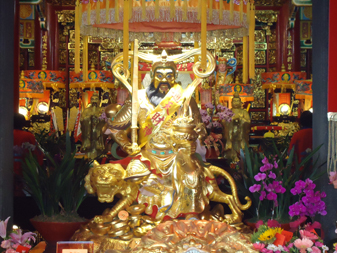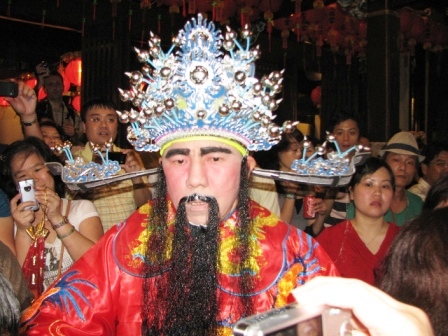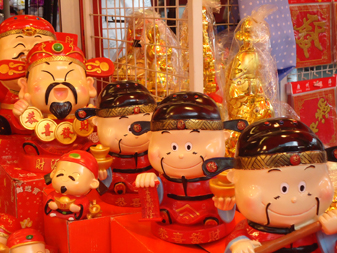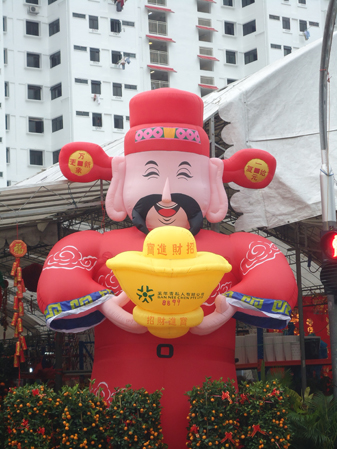God of Wealth
财神
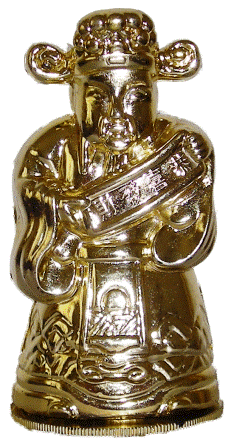 The God of Wealth is a Chinese deity who can bless one with luck, wealth and economic opportunities. Although worshipped throughout the year, he is especially popular during the Chinese New Year when the community welcomes a new year and mark the start of a new social calendar. The God of Wealth is a Chinese deity who can bless one with luck, wealth and economic opportunities. Although worshipped throughout the year, he is especially popular during the Chinese New Year when the community welcomes a new year and mark the start of a new social calendar.
During this time, his image appears on posters, New Year cards, red packets, in the shape of a candy and even as a mascot! Nearing the new year, some organisations even invite an artiste dressed as the God of Wealth to send New Year greetings.
Usually dressed in the style of a Chinese Mandarin official and in red, he holds symbols of wealth such as a gold ingot or the Ruyi, a sceptre stylised as a celestial fungus.
The most well-known God of Wealth is Zhao Gong Ming but the God of Wealth is also commonly regarded as the manifest of not one but several individuals commonly associated with the ability to bless people with wealth, luck and economic opportunity.
Zhao Gong Ming, 赵公明
Zhao Gong Ming is a Taoist deity and considered as a Martial God of Wealth. His birthday is commemerated on the 5th day of the 1st lunar month. Click here for this year's date.
While he is not tasked directly in the regulating of wealth, he is in charge of four deities who bless people with different forms of luck and wealth (东-招宝天尊萧升, 西-纳珍天尊曹宝, 南-招财使者陈九公, 北-利市仙官姚少司)
As a result of this association, he is often referred to as the God of Wealth. Zhao Gong Ming and his 4 disciples are also known as God of Wealth of the Five Directions.
Guan Yu, 关羽
Guan Yu was a general of Shu Kingdom during the Three Kingdoms period. His ideals of brotherhood and loyalty could not be shaken despite generous offers of wealth and office.
Merchants and businessman admired his integrity and considered him as their patron and referred to him as a Martial God of Wealth. He is also considered as the God of War and symbolises loyalty, integrity and brotherhood.
Bi Gan, 比 干
Bi Gan was a minister of Shang Dynasty and member of the imperial family. Worried that the Shang king is besotted by his concubine Daji and neglecting state affairs, he risked his life to advise the king.
Daji was extremely offended and influenced the king to demand that Bi Gan demonstrate his loyalty by digging out his heart. Bi Gan did so but was survived by Jiang Zi Ya.
Disillusioned by court politics, he resigned and distributed his wealth. Businessmen who prayed to him are perceived to be honest people who treat customer fairly.
Fan Li, 范蠡
Fan Li was a minister in the Kingdom of Yue during the Spring and Autumn Period in China. He is thought to be instrumental in presenting the beauty Xi Shi 西施, to King of Wu as part of a strategy to defeat the kingdom of Wu.
After the defeat of Wu, Fan Li left court service and lived as a successful businessman under the name of Tao Zhu Gong, 陶朱公. He is admired for business success but also for his principled ideas of business management and corporate social responsibility.
Notions of wealth
The variations of God of wealth and the backgrounds of these individuals illuminate the social and ethical dimensions in which the notions of wealth are constructed.
In other words, people desire wealth but makes a distinct between the source, type and ways in which wealth is generated.
Related articles:
|

 The God of Wealth is a Chinese deity who can bless one with luck, wealth and economic opportunities. Although worshipped throughout the year, he is especially popular during the
The God of Wealth is a Chinese deity who can bless one with luck, wealth and economic opportunities. Although worshipped throughout the year, he is especially popular during the 
 Chinese New Year
Chinese New Year